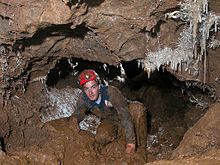

Caving, also known as spelunking (United States and Canada) and potholing (United Kingdom and Ireland), is the recreational pastime of exploring wild cave systems (as distinguished from show caves). In contrast, speleology is the scientific study of caves and the cave environment.[1]
The challenges involved in caving vary according to the cave being visited; in addition to the total absence of light beyond the entrance, negotiating pitches, squeezes,[2] and water hazards can be difficult.[3] Cave diving is a distinct, and more hazardous, sub-speciality undertaken by a small minority of technically proficient cavers.[4] In an area of overlap between recreational pursuit and scientific study, the most devoted and serious-minded cavers become accomplished at the surveying and mapping of caves and the formal publication of their efforts. These are usually published freely and publicly, especially in the UK and other European countries, although in the US they are generally more private.
Although caving is sometimes categorized as an "extreme sport," cavers do not commonly use this terminology and typically dislike the term being used in reference to caving, as it implies a disregard for safety.[2][5]
Many caving skills overlap with those involved in canyoning and mine and urban exploration.
- ^ Caving in New Zealand (from Te Ara: The Encyclopedia of New Zealand, Accessed 2012-11.)
- ^ a b "Many find caving's challenges, thrills illuminating". NewsOK. 8 June 2008. Archived from the original on March 26, 2013. Retrieved 12 November 2012.
- ^ Pearson, Anna. "Caving in New Zealand". Stuff.co.nz - Fairfax NZ News. Retrieved 12 November 2012.
- ^ "About Caving". british-caving.org.uk. British Caving Association. Retrieved 31 August 2018.
... people start... as sporting cavers and develop... other interests such as... cave diving...
- ^ Chiacchia, Ken (6 April 2001). "Extreme Caving - Gorgeous settings present dangers and challenges in Omnimax film". Pittsburgh Post-Gazette. Retrieved 12 November 2012.